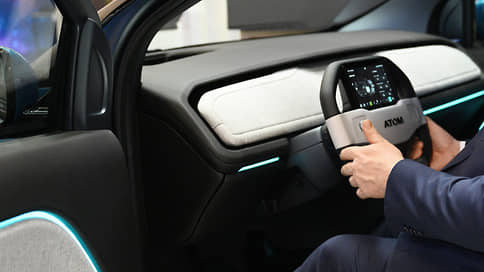Renera bought a stake in Kama for 6.2 billion rubles
[ad_1]

As Kommersant learned, Rener, a subsidiary of Rosatom, which is building a gigafactory in Kaliningrad, has invested 6.2 billion rubles. in JSC “Kama”, the developer of the electric vehicle “Atom”. As a result, the share of Renera, according to Kommersant, could be about 23%. Rosatom calls the deal “a relatively small investment in a promising project” and talks about a synergistic effect for its business of producing components for electric vehicles. Analysts disagree about the real cost of the Kama project, calling it rather risky.
LLC Renera (a structure of Rosatom) acquired a stake in JSC Kama for almost 6.2 billion rubles, follows from the company’s financial statements for 2022. Rosatom explained to Kommersant that Renera acquired a share less than the blocking stake. In the report, Kama appears as a “dependent company”, which means that Renera’s share is at least 20%.
In October 2022, RTVi, citing a presentation for investors, reported that Kama JSC wants to raise $150 million in financing from a pool of investors by selling 37.5% of the company. Based on this assessment, the entire company was valued at $400 million, and Renera’s share could be 23%. At the same time, the presentation (Kommersant has it) talks about a pre-deal valuation of $250 million, forecast capitalization by 2030 was expected in the amount of $5-50 billion with a median value of $18.2 billion with sales in the Russian Federation and for export of 267 thousand units in 2030. Serial assembly of Atom electric vehicles is scheduled to begin in 2025. The last site for assembly was the Moskvich plant (KamAZ acts as a technology partner in the project).
The shareholders of Kama JSC are not disclosed, the company does not have publicly available statements. The company was founded by the head of KamAZ Sergey Kogogin and Ruben Vardanyan, then KamAZ entered it. According to the presentation, after the entry of new investors, the founders and KamAZ should have had 31.3% each. At SPIEF in 2023, Mr. Kogogin told reporters that he and Mr. Vardanyan each invested about $1 million in the project at its start. He also said that Vardanyan, Broitman and Partners was no longer contributing money to the project.
RTVi reported that in addition to Rosatom, investment negotiations were held with Kaspersky Lab and Yandex. Kama, during the presentation of the Atom electric car prototype in May, showed the Atomverse OS developed for this car based on Kaspersky OS. In “Kaspersky Lab” “Kommersant” did not answer. In Yandex Taxi, Kommersant was told that “the Yandex group of companies does not participate in investments in the Kama company.” They added that they support the emergence of local players ready to develop industry solutions.
Rosatom called the deal “a relatively small investment in a promising project”, noting that they believe “in this asset and in the future of the Russian electric transport market.” The state corporation clarified that they do not plan to become a car manufacturer, but “the deal may have a positive synergistic effect for a number of our new businesses related to the production of components for electric vehicles.” “Nuclear industry enterprises are already capable of producing about 60% of all components of an electric vehicle, including batteries, electric motors and magnets made from rare earth alloys, a trace element base, polymer and composite materials,” the company explained.
Rosatom is building a gigafactory in Kaliningrad: in June, Renera-Enertek signed a special investment contract (SPIC) for this project with an investment of 47.1 billion rubles. The SPIC will give them the right to call products Russian even before the actual launch of the plant: Renera transports cells to the Russian Federation from its South Korean Enertech plant, and the plant in Kaliningrad will start operating in the fall of 2025. At the same time, in the SPIC register, the start date for the production of batteries is 2023, cells – 2025. The total production volume will be 18.5 GWh (more than 230,000 traction batteries).
Kama said that Rosatom is a technology partner in the development and production of an integrated electric drive traction battery. On April 26, Kommersant wrote about the purchases of Rosatom companies for the Atom project. Kama did not comment on the details of the deal, noting that in November 2022 the Atom project received support from several technology companies that joined the list of shareholders following a round of venture investments.
Dmitry Babansky from SBS Consulting believes that, based on the sales plans announced by investors, the purchase price of Rosatom is adequate to the market. Dmitry Kasatkin from Kasatkin Consulting does not agree with him, according to which the Kama project can be valued at $100–150 million: “Such an assessment is associated with the risks of implementing ambitious sales plans, technological risks and operational efficiency.” “This startup cannot be compared with projects from China such as Xpeng, Nio or Li auto, even at similar stages of development, since these companies involved leaders in the automotive industry in terms of technology, and the market moment was favorable for them,” the expert concludes.
[ad_2]
Source link





